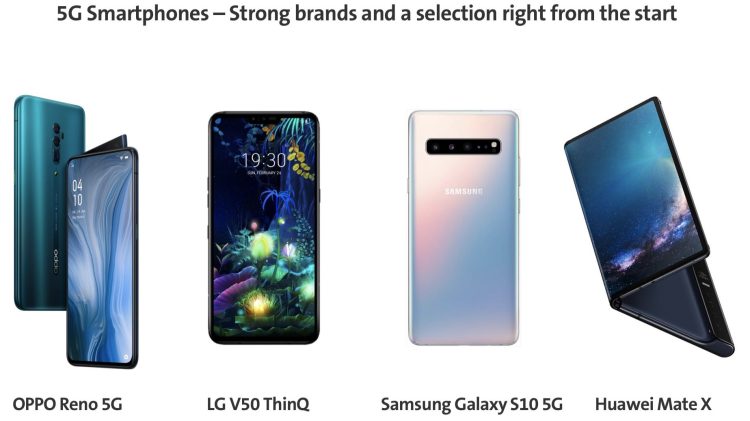Now that commercial 5G networks have launched in North America and Asia, it’s Europe’s turn, and Swisscom is preparing to lead the continent with 5G deployments in Switzerland this year. Today, Swisscom and Qualcomm separately trumpeted what the latter characterized as Europe’s “first-announced commercial services” for 5G, the latest milestone in the rollout of 5G networks worldwide.
Swisscom has aggressive plans to roll out 5G hardware, beginning with the May launch of Oppo’s Reno 5G for the Swiss equivalent of $1,000, calling it Switzerland’s first commercially available 5G smartphone. LG’s V50 ThinQ 5G will arrive for around $1,100 in the same month. Samsung’s Galaxy S10 5G will follow in July for $1,280, with Huawei’s Mate X at roughly $2,500 in the third quarter of 2019.
Conventional broadband solutions also appear to be in the offing. Qualcomm notes that Askey is bringing a consumer broadband solution to Swisscom, while Wistron NeWeb’s automotive and industrial unit has a broadband product as well. Swisscom is also planning a 5G Booster for users in rural areas, with pilots starting this summer and commercial availability in 2020.

June 5th: The AI Audit in NYC
Join us next week in NYC to engage with top executive leaders, delving into strategies for auditing AI models to ensure fairness, optimal performance, and ethical compliance across diverse organizations. Secure your attendance for this exclusive invite-only event.
“This milestone is testament to the strong collaboration that took place across the ecosystem to accelerate 5G commercialization by one year, allowing for the arrival new and exciting user experiences,” said Qualcomm SVP Enrico Salvatori. “5G is now here in Europe, ready to fundamentally enrich how we live our lives.”
The hitch in Europe isn’t hardware, but 5G network support. Switzerland’s Federal Office of Communications has yet to issue licenses to activate commercial 5G within the country, though Swisscom says it has already worked with Ericsson to set up the necessary 3.5GHz network hardware. Once Swisscom’s license is granted, it will be able to rapidly commence service.
Using that network, Swisscom customers will be able to achieve up to 2Gbps speeds, with the latest real-world demonstration showing a peak of 1.86Gbps. The 2Gbps service — referred to as a “premium speed” upgrade to the company’s $60 100Mbps 4G service — will cost an additional $10 per month. Swisscom is promising wide 5G coverage in the entire country by the end of 2019, including cities, countryside, and mountainous areas.
With plans in place, whether Swisscom is actually first to 5G in Europe now depends entirely on how quickly the Swiss government acts to approve its license. Publicly announcing both its own readiness and the availability of 5G smartphones might help the carrier speed up necessary regulatory approvals, an area where Europe is expected to fall behind much of the world.

